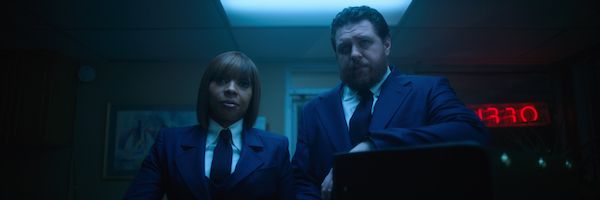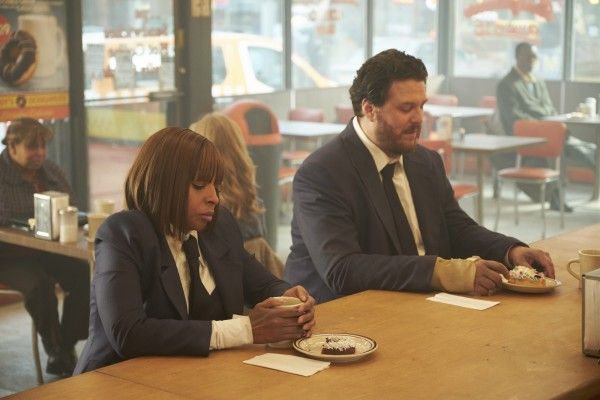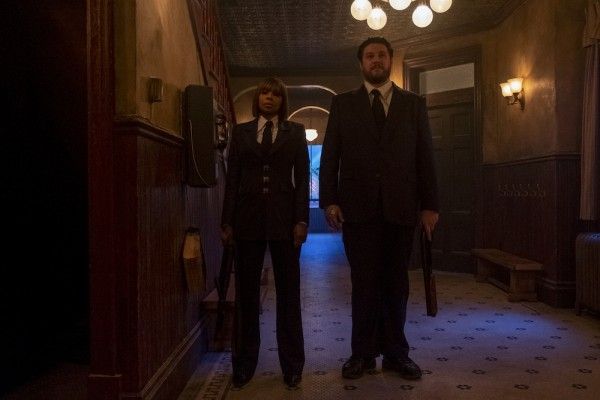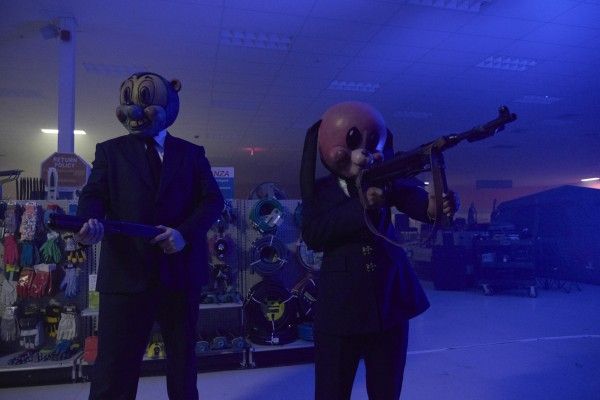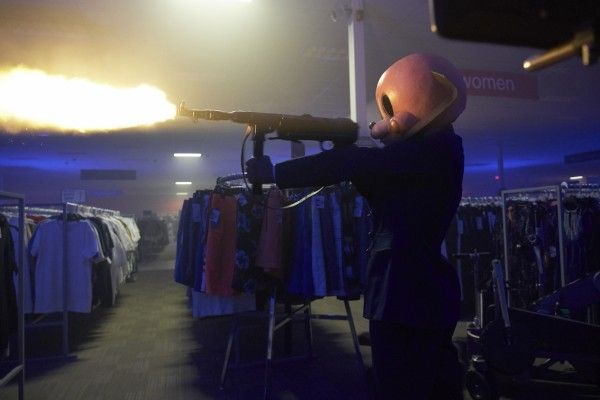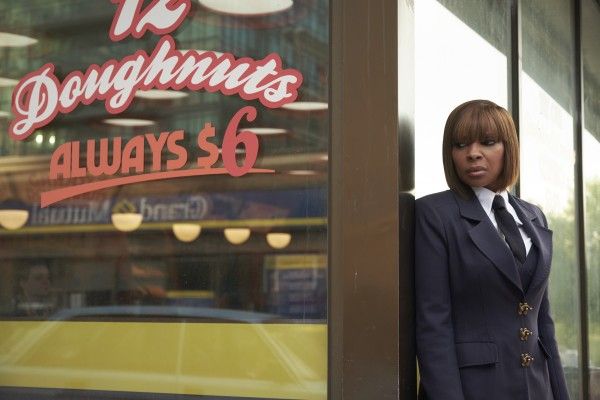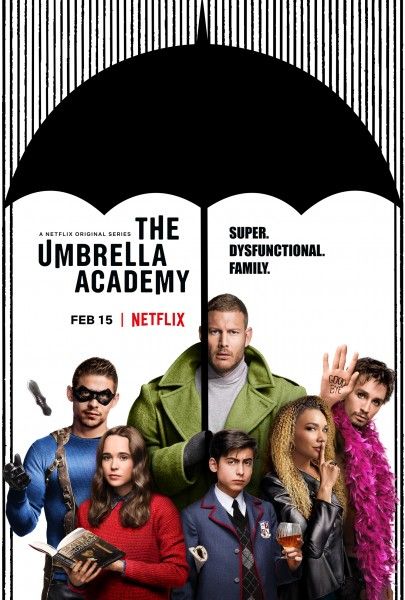Based on the popular and award-winning Dark Horse Comics graphic novels created by Gerard Way (My Chemical Romance) and illustrated by Gabriel Bá, the Netflix series The Umbrella Academy follows the “children” of Sir Reginald Hargreeves (Colm Feore), a billionaire industrialist who adopts seven of the 43 infants inexplicably born on the same day in 1989 to random women who showed no signs of pregnancy the day before. While they’ve been prepared to save the world, things are never that easy, and now that the impending apocalypse is very real, Luther (Tom Hopper), Diego (David Castañeda), Allison (Emmy Raver-Lampman), Klaus (Robert Sheehan), Vanya (Ellen Page) and Number Five (Aidan Gallagher) must get over their own family drama, if they have any chance of stopping global destruction.
At the Los Angeles press day to promote the new series, Collider got the opportunity to sit down with co-stars Cameron Britton and Mary J. Blige (who play time-traveling assassins Hazel and Cha-Cha, respectively) to talk about their reaction to this material, playing characters with such a unique relationship, developing their own backstory for their performances, their favorite scene to shoot, the fun of playing a bad-ass, wearing the masks, the adversarial boss-employee dynamic with The Handler (Kate Walsh), and what they loved about working with each other. Be aware that some spoilers are discussed.
Collider: I loved this, and I love your characters so much!
MARY J. BLIGE: Good!
When this came your way, what was your reaction to the material? Did you have a lot of questions?
BLIGE: For me, I was so excited about the character. The whole thing was exciting to me. I was like, “Yes, it will be a challenge, but I can’t wait to see what it looks like, once we start shooting.” I dove into it.
CAMERON BRITTON: For me, it was stressful because they gave us two episodes, and then maybe a third before shooting, and I didn’t know where these characters were going to go. They go on a pretty crazy ride. I didn’t fully understand the character yet. It’s that thing with the first season of a show, where you watch and, early on, the actors are still figuring out the characters. If you go back to Season 1 of The Office, Steve Carell’s character is a lot different. At the same time, I knew I was having fun. I knew we were doing something risky and unique, which was what drew me to it, in the first place. By the end of the show, I was super immersed in the plot and what was going on for Hazel. I find him to be really unique, so that was fun.
Hazel and Cha-Cha really have their own little journey that’s so interesting, but they don’t have a lot of backstory and we don’t get to learn too much about their history, especially initially. Did you develop that for yourself? Did you create histories for who these people are and where they came from?
BLIGE: Well, not exactly where the character came from, but who she was is what I created for her. What are her inner thoughts? What’s making her into this horrible person? I had to conjure up a whole bunch of stuff that would make her into the person that’s now so empty. She’s an empty person and she doesn’t care. I had to find those places. I can’t tell you what they are, but they were really bad places.
BRITTON: Yeah, I also found that very challenging. Whenever you have a role where you don’t get to know anything about the character, you have to invent it yourself. You have to feel like it came from somewhere. A lot of figuring that out was with the dynamics with Cha-Cha. I figured out a lot of who Hazel is by doing the scenes with Mary. It really helped develop it. I don’t think, when it started, that I was anywhere near thinking of them like a little brother/big sister thing, but it really felt like that, at the end. There were some really interesting, heavy scenes. It’s a man and a woman, but we weren’t interested in a romantic element to the show. There was a little conversation of that, but even friends didn’t really feel right. That little brother/big sister thing felt like the right place to go with it. That helped everything fit into place.
Do you think that these two people genuinely care about each other, or are they with each other because they have to be?
BLIGE: I think that because it’s been a long period of time that Hazel and Cha-Cha have done this together, Cha-Cha doesn’t care about anybody else in the world, but Hazel. Hazel is all she has to help her do what she loves, which is to kill people. She loves the heck out of Hazel because this is what they do. So, yeah, she cares about Hazel. She doesn’t care about anyone else.
BRITTON: Yeah, they do. The only property they own is on their backs. They have to stay very incognito, in general. They live hotel room to hotel room. They’re always working. The last eight years, all they’ve had is each other. Anyone else they meet, they’re murdering. Eventually, there’s a pretty tight bond there. That’s when the show gets interesting when you’re finally seeing Hazel have enough and you’re seeing him say, “This isn’t a life that can make anyone happy.” Cha-Cha disagrees because she has no heart and no soul. She can just do this, all day. And I love Cha-Cha for that. When you have a character who really cares about no one, what happens when the only person she has any affinity for is pulling away from her? It’s pretty cool to watch, and it’s really interesting to watch. You don’t see many bad guys fight amongst themselves. Bad guys always know exactly who they are and what they want. Good guys are the ones who are a little confused about their identities. So, it’s really cool to be on a project where one of the bad guys is pretty mixed up and confused. It leads to some really interesting storylines.
I was surprised at how much emotionally connected to them and their story.
BRITTON: Yeah, and that’s ideally the kind of projects you want. You don’t want to make performances, you want to make people. When a project knows, “Okay, my bad guys need to be a little sympathetic, and my good guys need to have a bit of a mean streak,” you’re off to a good start.
Because you get to do so many crazy, fun things in this show, did you have a scene that you most enjoyed shooting?
BLIGE: I had so much fun with everything, but my favorite scene was the fighting scene with Hazel because it’s what I so heavily desired to do. I wanted to see myself doing that. I imagined myself doing it, and when I did it, it was fun. It was fun fighting Hazel. He’s a big man, and I’m just crazy like that. That’s why Cha-Cha is who she is. That was my favorite scene.
Cha-Cha is a bad-ass.
BLIGE: Yeah, she sure is!
BRITTON: That was my favorite scene, too. I loved doing that fight. How it was choreographed, there was a little bit of comedy in it, as well. The fight wasn’t just two people duking it out. It was coming from somewhere. It was eight years of build-up, to that moment. You want climatic scenes to pay off, and sometimes they don’t, but that was really gratifying. We won’t say who wins that fight, but you probably have a pretty good idea.
I also loved the fight between Hazel and Diego.
BRITTON: Me too. They’re funny situations to put people in fights, and I love that about the show. Anytime there’s a really heavy fight going on, there’s usually some upbeat music behind it. The show is twisted and ironic like that.
What was it like also having the masks, and how much time did you have to spend in them?
BLIGE: I hated those masks, and I don’t care if I ever see it. I couldn’t breathe in mine, and I couldn’t see. I was like, “This is a nightmare!” It was not a cool thing.
BRITTON: Yeah, the masks are a fun aesthetic, but I want to see what the characters are doing when they’re fighting. If they’re in a mask, I can’t really see it. Plus, with the masks on, they’re forced to use our takes when we’re fighting, and not our stunt doubles. That’s a lot of why you sign up, because you want to do a fight.
Were there ever fights or action sequences that you weren’t able to do, that you were really bummed you couldn’t do yourself?
BLIGE: The crazy thing is that, with our fight, we were supposed to fight again the next day, but we were so beat up and bruised that they wouldn’t let us fight again. We were like, “We took Epsom salt baths.” And they were like, “No, you guys are not fighting!”
BRITTON: It was mostly my fault that I beat myself up. I still have the scar on my forehead to prove it. The stunt doubles would do stuff that I didn’t want to do, if that makes sense. If I had to do a backflip, then my stunt double had to do the backflip. They filled in on things that I wanted nothing to do with, and they were really, really good stunt doubles. I don’t know how common it is to have folks that are that dedicated to the characters and fighting like the characters, and not just going through the motions. They put a lot of emotion behind it.
BLIGE: Yeah, they were amazing.
BRITTON: We got really lucky. This was the first project [Mary’s stunt double] had ever worked on.
BLIGE: She was amazing and super young.
BRITTON: She’s 20 years old and a black belt. She knew that she had to do backflips, so she went on YouTube and figured out how to do backflips. She was great, doing it off of a platform. It was insane!
One of the best things about the Hazel/Cha-Cha relationship is the chemistry that you guys have together. It’s such an odd couple dynamic, and just so much fun to watch. What did you enjoy about working with each other, and what did you learn about each other from working together?
BLIGE: I learned that Cameron is an amazing person. It makes me feel good to find people that are genuinely cool and down to earth, and that want to see you do better in life, and I felt that from Cameron. I felt like he was a team player who wanted to see me succeed, and that made me comfortable. Once I feel safe, I let people in, and I felt safe and let him in, and it was on. There was laughter and chemistry, and that just felt good.
BRITTON: Yeah, I can’t imagine enjoying this project without Mary. This was my first time as a regular on a TV show, and it was hers, as well, so there were some nerves there. Going through that with someone was helpful. Also, developing a partnership with characters and their dynamics and being to able to talk that out is helpful. We spent a lot of time, off set, talking about where the other was coming from. It worked out. By the time you get to that scene where she’s chained to a radiator, that was one of my favorite scenes to shoot because we know everything that’s been going on. We know them fully, in and out. This is their first time really saying what’s on their mind and who they are, and there’s no turning back from it. That was cool. I haven’t sat with a scene partner and discussed the characters’ dynamics like that. Not in the film world. And that was really fun.
The dynamic Hazel and Cha-Cha have with The Handler (Kate Walsh) is definitely an interesting one. What can you say about that relationship?
BRITTON: It’s weird because The Commission intentionally keeps its employees at bay and stays mysterious. Some of the employees at The Commission aren’t even sure who Hazel and Cha-Cha are, and that goes both ways. Cha-Cha loves how impersonal it is. She loves them not being in her business, as long as she does what they tell her to do. Then, everyone is happy. It drives Hazel up the wall that they don’t explain a thing. That drives him crazy. It’s definitely fun, working with The Handler because you’re scared of your boss. You don’t like your boss, but you don’t really even know if you can not like your boss because you don’t know your boss because she’s so secretive. She dresses so strangely and acts so strangely, on top of all of that. I like doing those scenes because you’re on your toes and you’re uneasy because your boss is pretty horrible. It’s amusing.
It seems like Cha-Cha would rather kill her then have to answer to her.
BLIGE: Yeah, pretty much. But there’s also a certain obedience that she has because she knows it’s her boss. She knows that it could be the end of her, if she doesn’t listen. It’s the one person that she has to listen to, and she’s not happy about that.
The Umbrella Academy is available to stream at Netflix.

